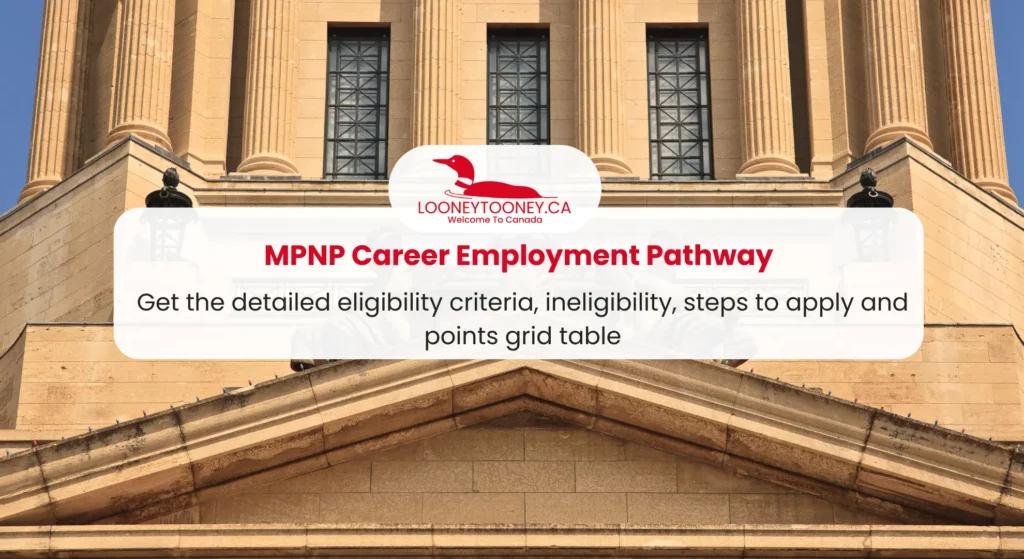The Canadian Experience Class (CEC) is an immigration program that allows individuals who have worked in Canada for at least one year to apply for permanent residency. The CEC is designed to address the declining labour market outcomes of new immigrants to Canada, by providing a pathway for temporary foreign workers and international students who have already gained valuable Canadian work experience. This article provides an overview of the CEC, including its eligibility criteria, the application process, processing time, and the documents required.
Table of Contents
- Eligibility Criteria for Canadian Experience Class
- Documents Required for Canadian Experience Class
- Application Process for Canadian Experience Class
- Processing Time for Canadian Experience Class
- Canadian Experience Class FAQs
Eligibility Criteria for Canadian Experience Class
To qualify for the Canadian Experience Class, you must meet the following criteria.
Skilled Work Experience
- Have at least one year of skilled work experience in Canada within the three years preceding your application. This can include part-time work.
- Gain your work experience while authorized to work under temporary resident status in Canada.
- Demonstrate that you performed the duties outlined in the lead statement of the occupational description in the National Occupational Classification (NOC), covering all essential duties and most main duties.
Your work experience should meet the following requirements:
- Eligible TEER Categories: Your skilled work experience must fall under one or more of the following NOC TEER categories: 0, 1, 2, or 3.
- Paid Work Experience: Your skilled work experience must be paid, including wages or earned commission. Volunteer work or unpaid internships are not considered.
You are ineligible for the Canadian Experience Class if you are
- A refugee claimant in Canada.
- Working without authorization.
- Your work experience was gained without temporary resident status in Canada.
- Self-employment and work experience obtained while being a full-time student, including co-op work terms.
Exemption for Physicians:
A temporary public policy has been introduced for foreign national physicians meeting the following criteria:
- Invited to apply and applied through Express Entry on or after April 25, 2023.
- Provided publicly funded medical services such as fee-for-service work in Canada.
- Are ineligible due to self-employment status.
Under this policy, such work experience is now counted as Canadian work experience. When creating your Express Entry profile, refrain from checking the “Self-employed work” checkbox under Work Experience in Canada to ensure your work experience is recognized as Canadian work experience.
Language Proficiency
Applicants must:
- Complete approved language examinations assessing proficiency in:
- Writing
- Reading
- Listening
- Speaking
- Achieve the minimum score stipulated.
- Input the test outcomes into their Express Entry profile.
Language Test Guidelines:
- Test results are valid for two years only from the date it as issued.
- Results must remain valid at the time of applying for permanent residence.
- The language eligibility of the Canadian Experience Class is listed below.
| NOC TEER | Minimum CLB for all language abilities (English) | Minimum CLB for all language abilities (French) |
| TEER 0 or 1 | CLB 7 | NCLC 7 |
| TEER 2 or 3 | CLB 5 | NCLC 5 |
Education
The Canadian Experience Class does not impose any educational requirements.
However, if you wish to enhance your ranking in the Express Entry pool, there are two methods to achieve this:
1. Canadian Education: Points can be obtained for a certificate, diploma, or degree from either a Canadian secondary institution (high school) or post-secondary institution if you have studied in Canada.
2. Foreign Education: Points can be earned if you have both of the following:
- A completed educational credential.
- An educational credential assessment report for immigration purposes from a designated organization, demonstrating that your education is equivalent to a completed certificate, diploma, or degree from a Canadian secondary institution (high school) or post-secondary institution.
Residency
- You must intend to reside outside the province of Quebec, as Quebec has its selection process for skilled workers. If Quebec is your intended destination, refer to information on Quebec-selected skilled workers for guidance.
- During profile creation, you will be asked about your intended place of residence in Canada. However, it’s not mandatory to settle in that specific province or territory.
- Provincial Nominees are required to settle in the province or territory that nominated them.
- You must meet the requirements for admissibility to Canada.
Documents Required for Canadian Experience Class
This can be divided into 3 parts as follows:
Documents for Your Profile
When creating your Express Entry profile, you won’t need to upload documents initially. However, you may require information from the following documents:
- Passport or travel document.
- Language test results.
- Proof of funds.
- Proof of Canadian education or an educational credential assessment report for immigration purposes if:
- You’re applying through the Federal Skilled Workers Program, or
- You wish to claim points for education obtained outside Canada.
- Provincial nomination certificate (if applicable).
- Job offer from a Canadian employer in written form (if applicable).
- Proof of work experience.
- Certificate of qualification issued by a Canadian province or territory in a trade occupation (if applicable).
Documents for Your Application for Permanent Residence
As of October 1, 2023, an upfront medical exam is no longer required before submitting your application for permanent residence through Express Entry. You will be informed about when to obtain medical exams and the necessary documents.
Upon receiving an invitation to apply, you will need to upload copies of the documents used for your profile. Additionally, most applicants will need to provide:
- Police certificates.
- Proof of funds.
- Birth certificate (if declaring dependent children).
- Use of a Representative form (if applicable).
- Common-law union form, if the marital status is declared as “common-law.”
- Marriage certificate, if marital status is declared as “married.”
- Divorce certificate and legal separation agreement (if declaring marital status as “divorced”).
- Death certificate, if marital status is declared as “widowed.”
- Adoption certificate, if there is a dependent child who is listed as “adopted.”
Other Documents Required for Canadian Experience Class
You must provide these documents solely if they are listed in your personalized document checklist. Failure to submit these documents will not result in refusal or rejection; they are solely used to verify program requirements. These documents may include:
- Proof of relationship to a relative in Canada.
- Digital photos for identity confirmation.
- Other names to confirm aliases.
- Authorization form for releasing personal information to a designated individual.
- Any additional documents considered important to your application.
Application Process for Canadian Experience Class
If an individual intends to immigrate to Canada as a skilled worker, the initial step involves creating a profile and submitting it to the Express Entry pool.
Upon meeting the eligibility criteria, the applicant will be:
- Placed in a pool alongside other eligible candidates.
- Given a score and ranked based on various factors.
- Invited to apply for permanent residency in Canada if ranked among the top candidates.
Follow these steps to apply:
Step 1: Eligibility Check
Prospective applicants can determine their eligibility by completing a questionnaire in their secure account, accessed by signing in and selecting “Apply to come to Canada” under “Start an application,” then choosing “Express Entry” and answering the questions.
Step 2: Creating an Express Entry Profile
When the questionnaire in the secure account is completed:
- Certain document information (e.g., language test results) and the NOC job title and code are required to complete the profile.
- Information is saved automatically, and individuals have 60 days to complete and submit the profile, or they will need to restart the process.
Dependent children’s information is not required during profile creation; it is only requested if invited to apply for permanent residence.
Step 3: Submitting the Express Entry Profile
Once the profile is filled out, it can be submitted online. Based on the provided information, authorities will determine the eligible program(s) under Express Entry and consider the applicant for potential invitations.
Program preference selection is not available during profile creation.
Processing Time for Canadian Experience Class
The processing time indicates the duration it typically takes for IRCC to process most fully completed applications in the past. It commences upon receipt of your complete application and concludes upon reaching a decision. Incomplete applications may face delays or be returned.
For the Canadian Experience Class application submitted online via Express Entry, the processing time is approximately 5 months.
The Canadian Experience Class (CEC) represents a significant evolution in Canada’s immigration strategy, by targeting temporary foreign workers and international students, the CEC aims to address the labour market outcomes of new immigrants and retain the talent that has already integrated into Canadian society.
The CEC offers several advantages, including faster processing times, recognition of Canadian work experience, and the ability to transition to permanent residency without a job offer. However, the program also faces some challenges, such as the highly competitive Comprehensive Ranking System (CRS) score requirement and the limited eligibility for lower-skilled workers. Prospective CEC applicants must carefully assess their eligibility, prepare their documentation thoroughly, and stay informed on any changes to the program’s requirements.
Canadian Experience Class FAQs
Q. Can I apply under the Canadian Experience Class if I am currently living in Quebec?
A. Yes, if you plan to live in Quebec, you must apply to the Ministère de l’Immigration, de la Diversité et de l’Inclusion du Québec as Quebec selects its own immigrants.
Q. Am I eligible for the Canadian Experience Class if I have returned to my country?
A. Yes, you can be eligible for the Canadian Experience Class if you meet the class requirements. This includes having gained at least 12 months of full-time (or an equal amount of part-time) work experience in Canada within the 3 years before applying, for a job listed as NOC TEER Category 0, 1, 2, or 3.
Q. I graduated a while ago, then earned one year of work experience and now I am in school. Can I apply for permanent residence under CEC now?
A. Yes, you can apply for permanent residence if you gained skilled work experience of at least one year in Canada in an occupation listed under NOC TEER Category 0, 1, 2, or 3. The experience must be within three years before applying.
Q. Do I still need to provide proof of language ability to apply for the Canadian Experience Class if I am from an English-speaking country?
A. Yes, all applicants must provide proof of language ability in one of Canada’s two official languages as designated by IRCC.
Q. Can I switch employers while working under a post-graduate work permit to get experience to qualify for the Canadian Experience Class?
A. Yes, you can work for any Canadian employer unless there are restrictions listed on PGWP. You should work in an occupation listed under the National Occupational Classification (NOC) at TEER 0, 1, 2, or 3 to be eligible.
Also read,





